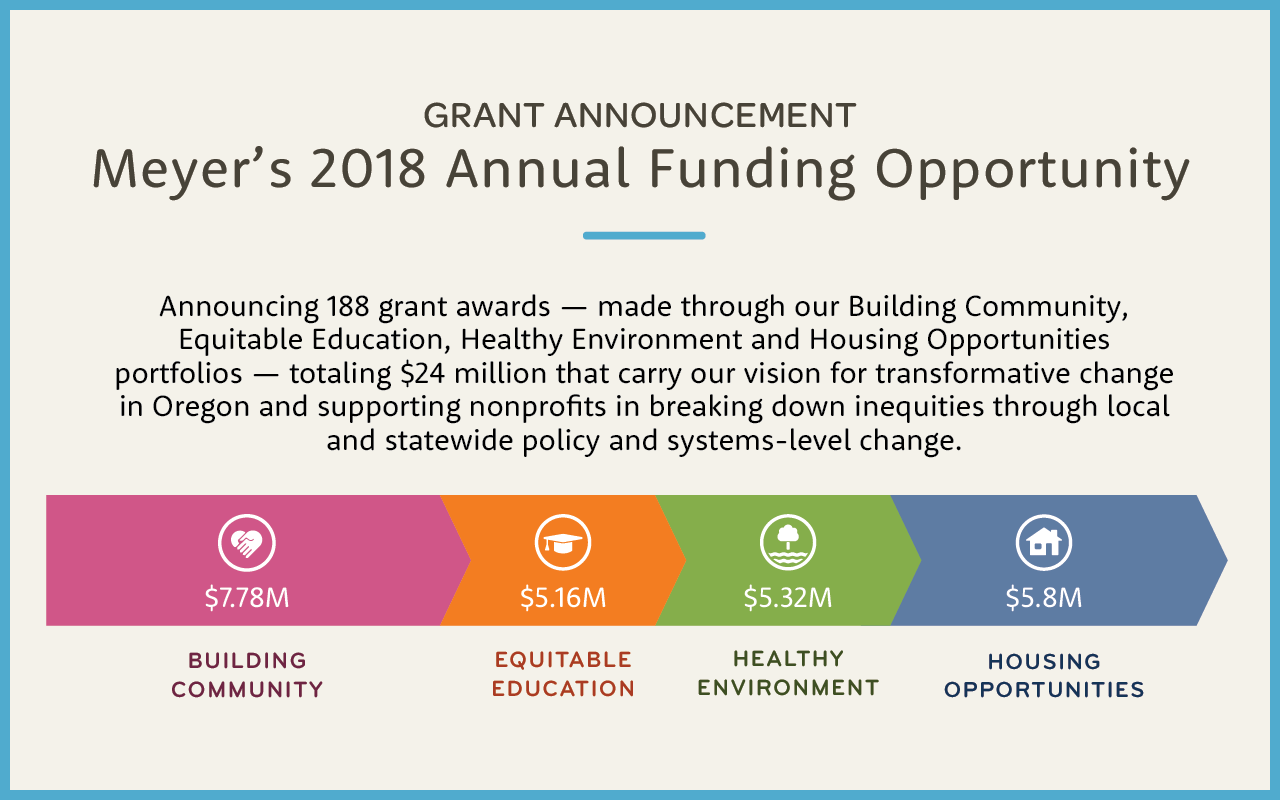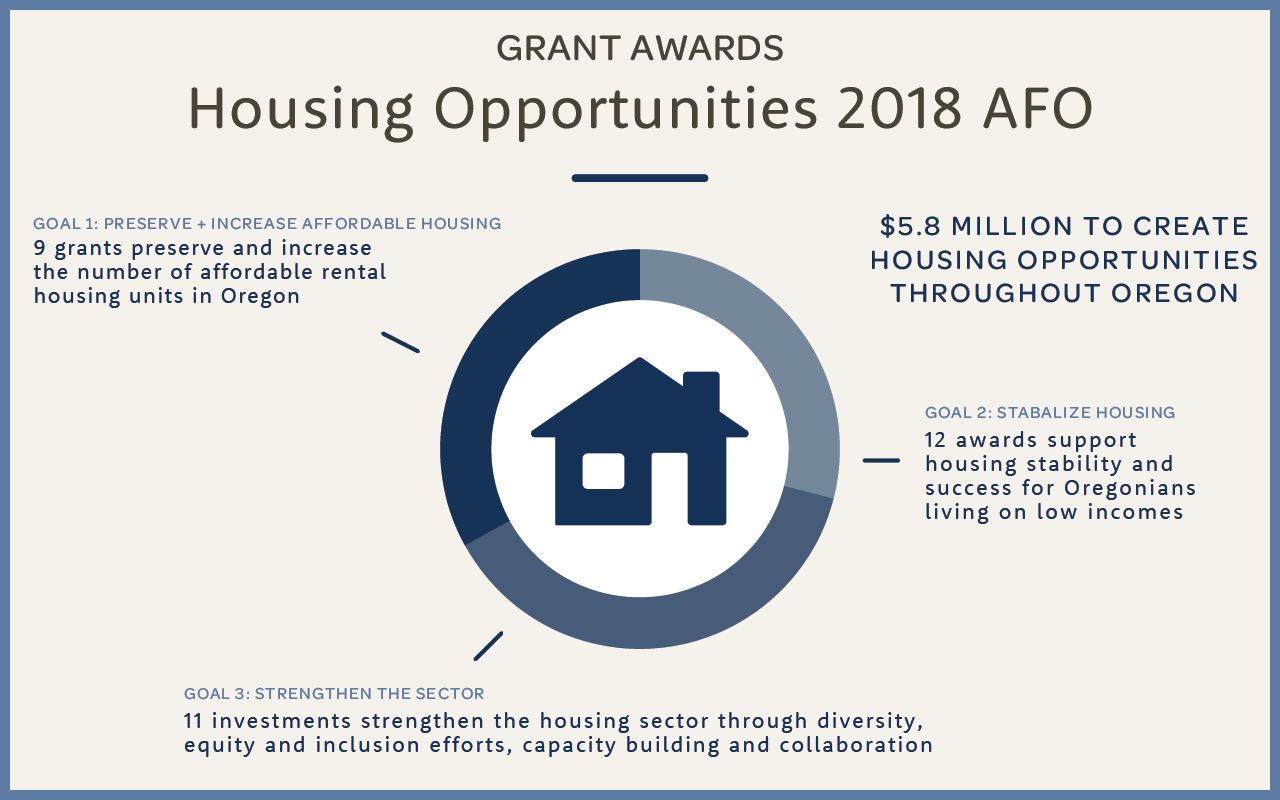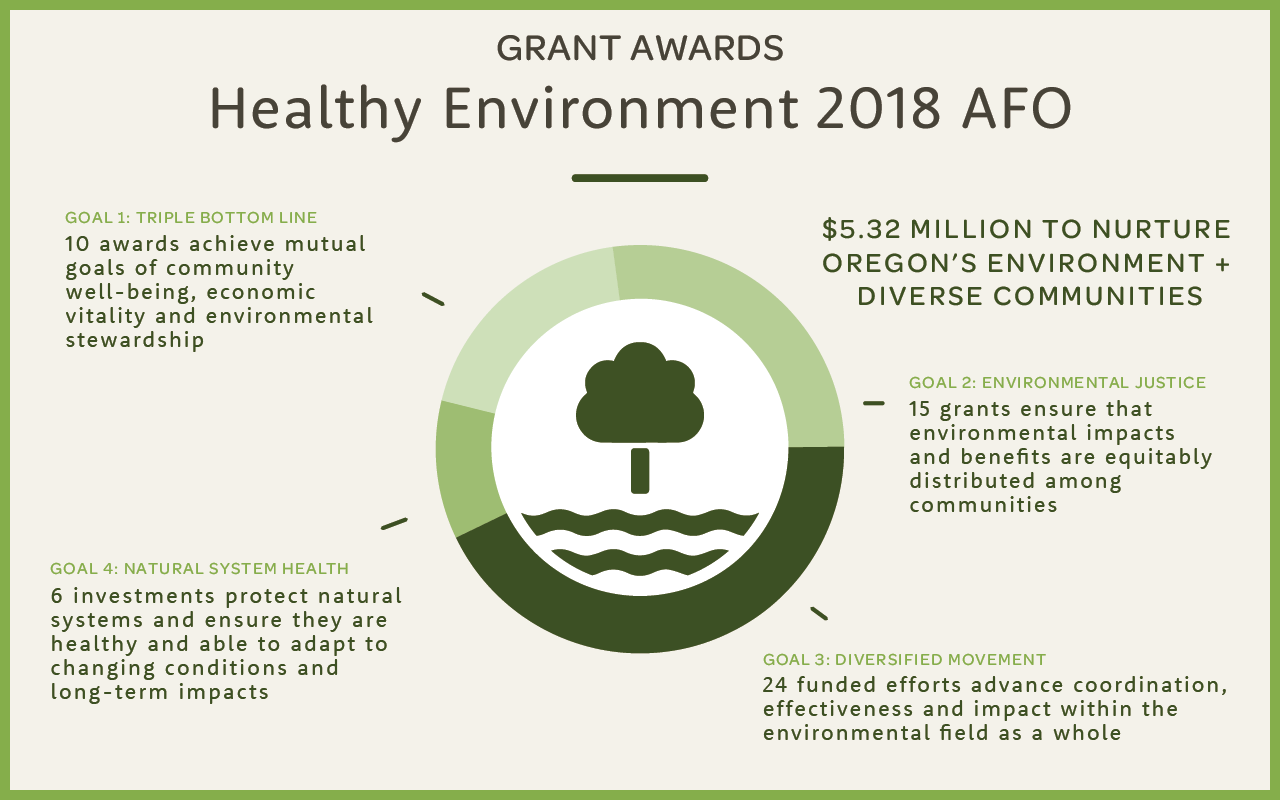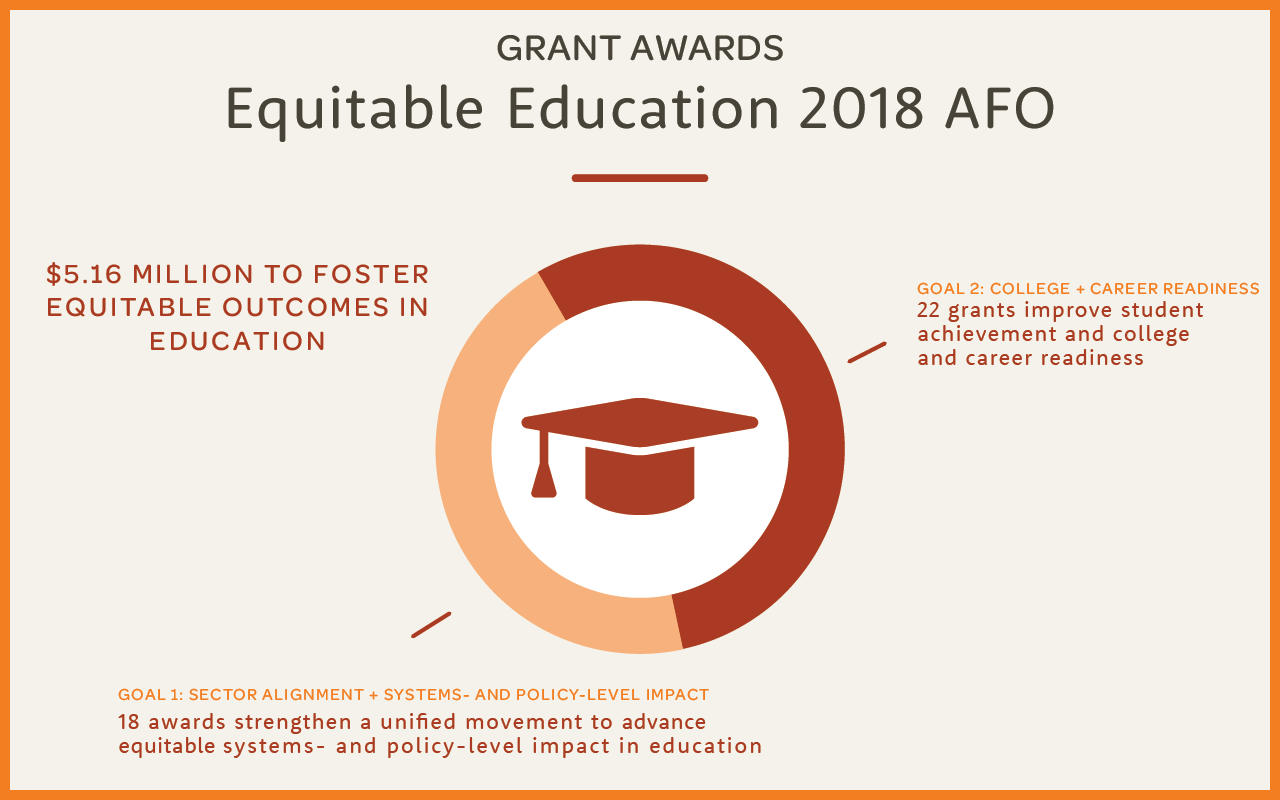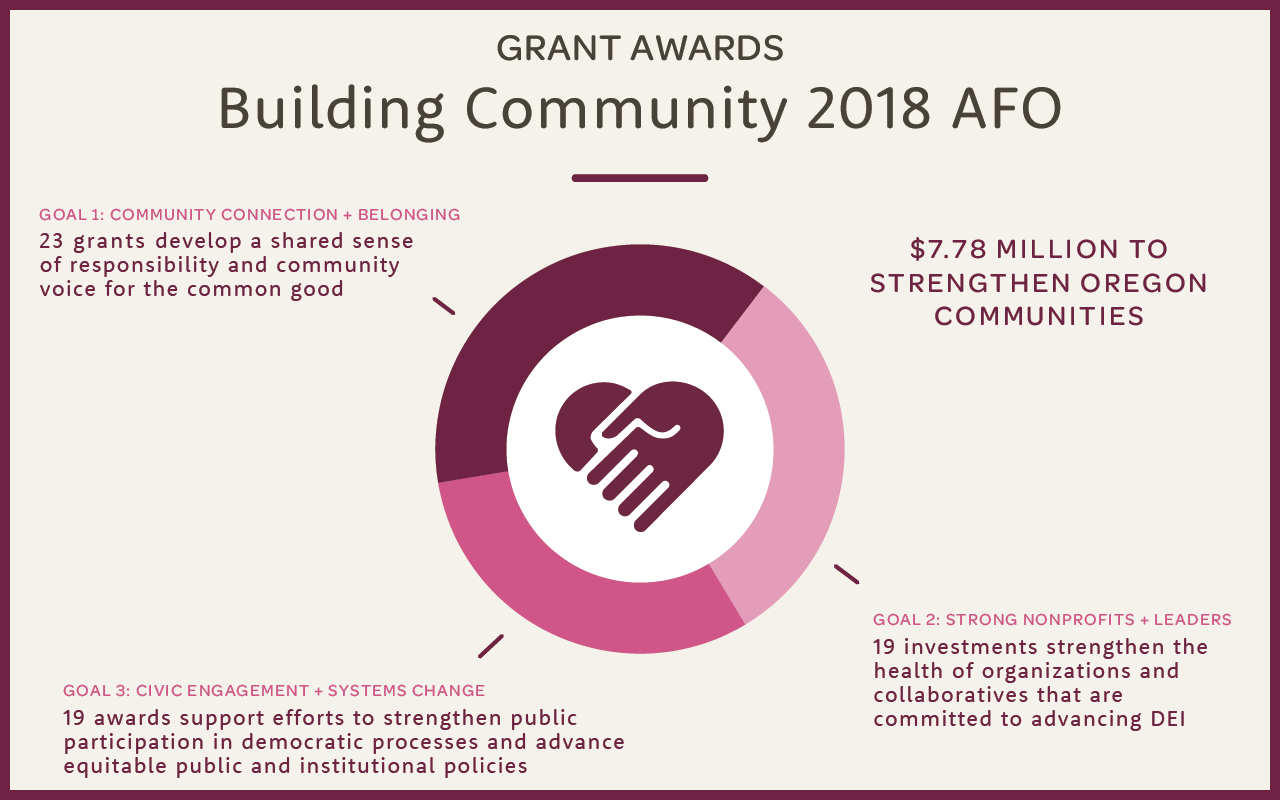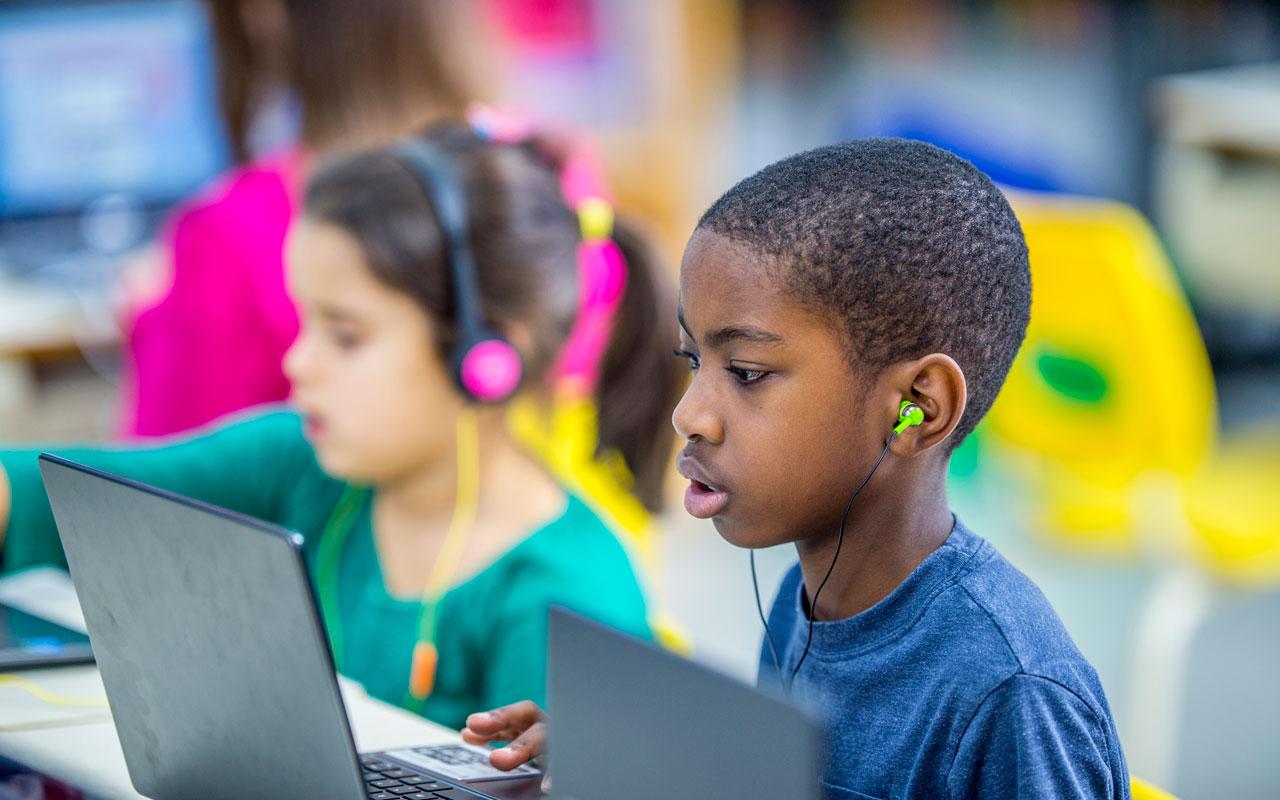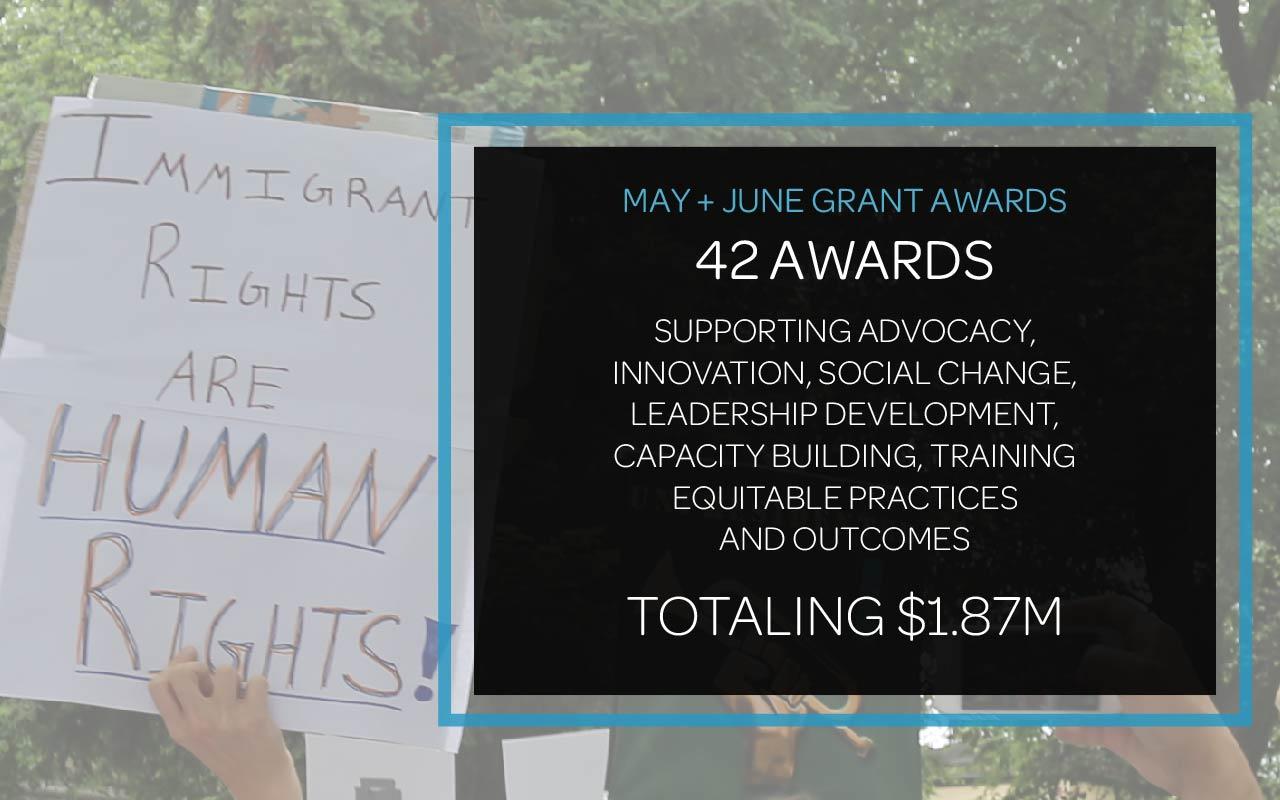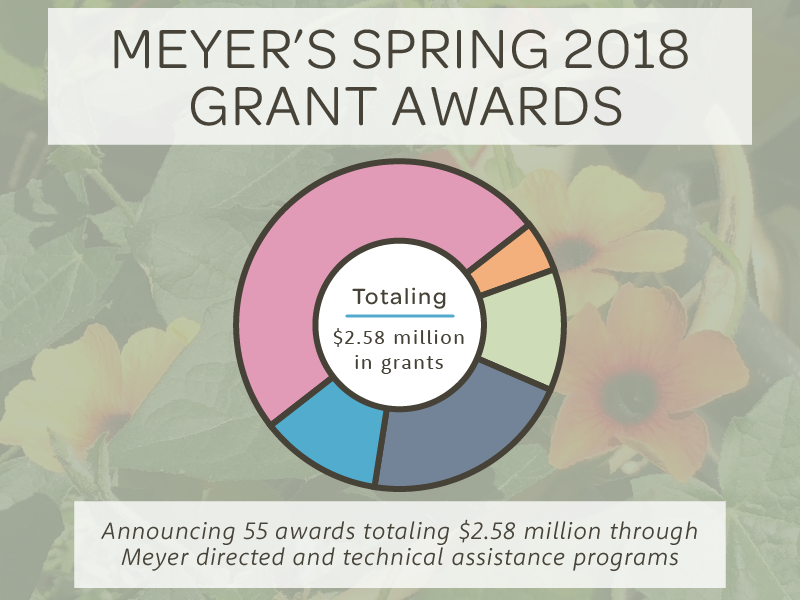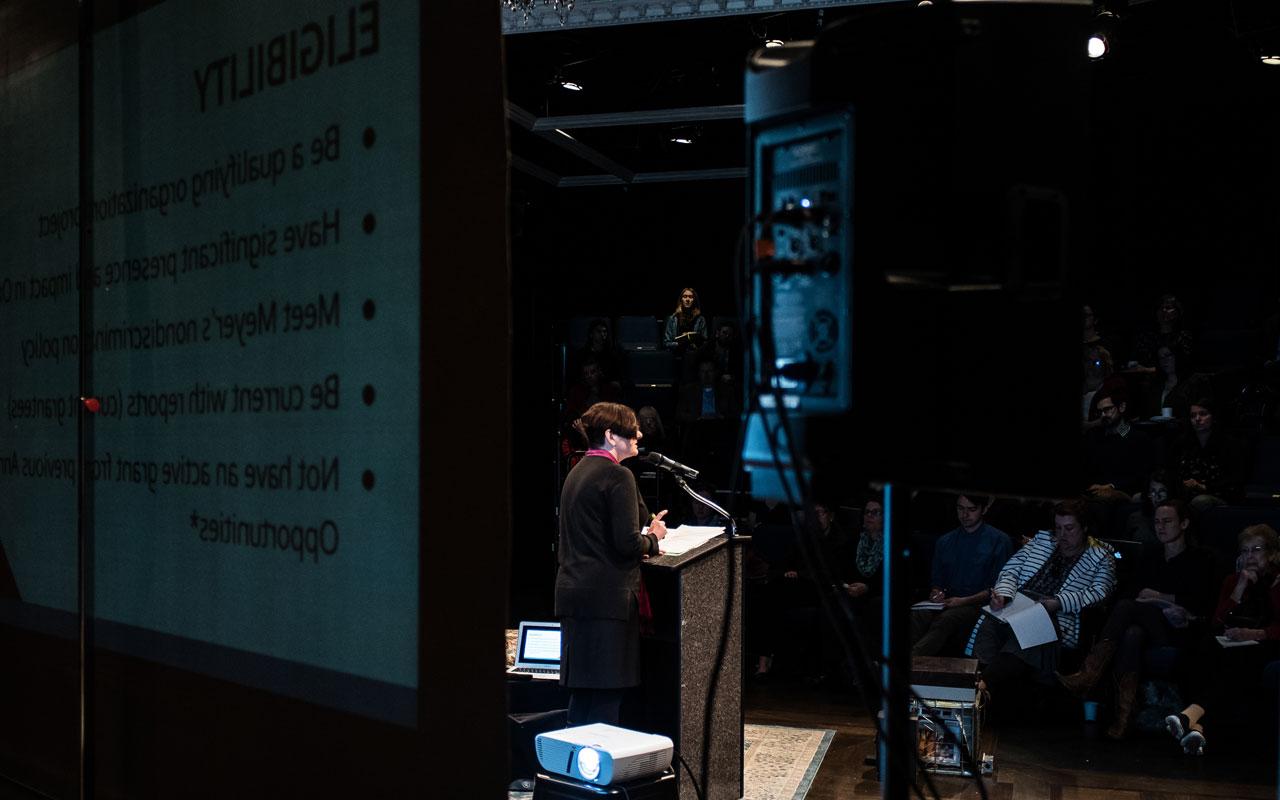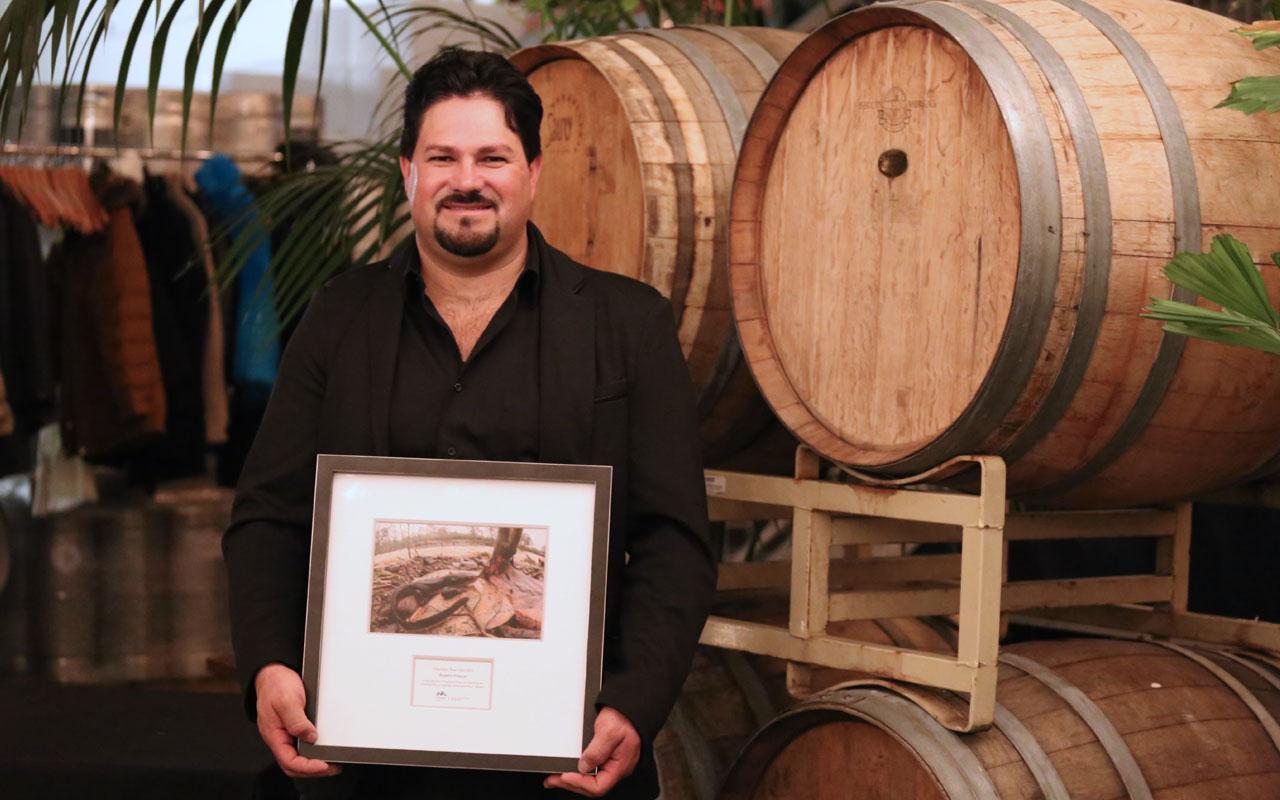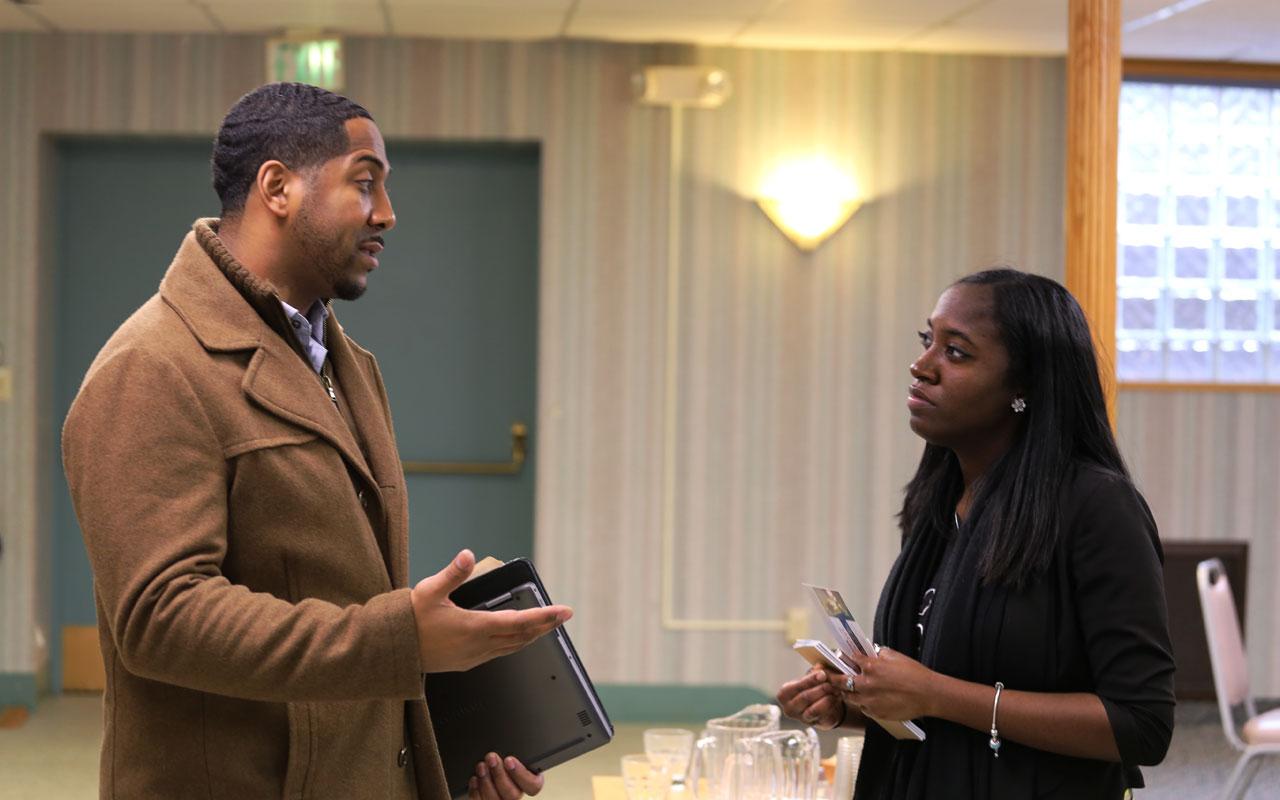2018 Annual Funding Opportunity grants total $24 million
Meyer Memorial Trust recently approved $24 million in grants to organizations working throughout Oregon to remove barriers to equity and create conditions in the state where all individuals thrive. Among the 188 Annual Funding Opportunity grants are efforts to directly dismantle systems perpetuating hate and injustice in Oregon, to push forward systems-level change across rural and urban communities, and to amplify the impact and credibility of community level solutions to advance justice.
Meyer's third Annual Funding Opportunity (AFO) supports 24 new-to-Meyer grantees, has statewide reach and overwhelmingly benefits communities and people who are marginalized and experience disparities. Those priority populations include people of color; lesbian, gay, bisexual, transgender and queer Oregonians; immigrants and refugees; women and girls; economically disadvantaged individuals; people with disabilities; indigenous populations and Tribes; and underserved rural communities.
The 2018 funding call includes support for efforts to build inclusive and diverse communities, to break down inequities through local and statewide policy and systems change, to support pathways for people most impacted by decisions to sit at the tables where those decisions are made, to grow organizations so diverse people see themselves reflected at all levels and to help build wealth in communities that have long experienced income disparities.
Specifically, this batch of grants will help build 204 new units of affordable housing and preserve an additional 34 affordable homes. Grants will support 23 organizations working to integrate diversity, equity and inclusion in their services and throughout their operations to better serve Oregonians. And the 2018 grant awards reflect partnerships with four of the state’s nine federally recognized tribes: the Confederated Tribes of Grand Ronde; the Confederated Tribes of Siletz Indians; the Confederated Tribes of the Umatilla Indian Reservation; and the Cow Creek Band of Umpqua Tribe of Indians.
In all, the foundation received 630 AFO applications this year, requesting more than $74 million through Meyer's Building Community, Equitable Education, Healthy Environment and Housing Opportunities portfolios. More than half of the requests were directed to the Building Community portfolio with the remaining spread across the other three portfolios.
Highlights from the Building Community portfolio awards
Meyer provided a $180,000 grant to Mano a Mano to support Radio Poder, a startup full-power, non-commercial FM radio station broadcasting in three indigenous Mexican languages: Purepecha, Mixteco and Trique. Radio Poder, "La Voz del Pueblo," aims to reach a Latinx community of 350,000 people throughout the Willamette Valley with trusted, vital and timely information focused on housing, immigration, workers' and LGBTQ rights, gender, criminal justice, health care, gun and domestic violence, local elections, community leadership, cultural traditions and other equity issues.
Meyer made a $175,000 grant to Elders in Action for coordination of a coalition focused on improving policies and services for low-income older Oregonians in Multnomah County. One-eighth of the county's population of 800,000 people are over 60 years old, the fastest growing demographic, projected to increase by 60 percent by 2025.
Meyer also made a grant of $99,600 to Self Enhancement Inc., to support the Portland African American Leadership Forum, which is implementing a newly adopted, community-driven strategic business plan. The Portland African American Leadership Forum, which helps Oregon's Black community build political participation and leadership, takes seriously the words of civil rights activist Fannie Lou Hamer: "Nobody's free until everybody's free."
These grants are among 61 Building Community portfolio awards, totalling more than $7.7 million, aimed at making Oregon a place where all Oregonians can be part of vibrant communities they help to shape and where they feel valued, represented and seen.
"We're looking for projects that propel systemic change in tangible ways," wrote Building Community portfolio director Dahnesh Medora in his blog post announcing the 2018 Annual Funding Opportunity awards. His team sorted through more than 350 applications. "This philosophy and belief in systems-level change is fundamental to what we do at Meyer: support solutions that counteract and fix the underlying issues of inequities and not just the symptoms that create the need for a given program or service."
Read more about the Building Community grants here.
Highlights from the Equitable Education portfolio awards
Meyer provided a $100,000 grant to the American Indian Science and Engineering Society for programming in computer science, science, technology, engineering and mathematics for Tribal and urban Native students throughout Oregon. The American Indian Science and Engineering Society (AISES) was founded 41 years ago with the mission of substantially increasing the representation of American Indians, Alaska Natives and Pacific Islanders in STEM-related fields. The grant is one of 40 Equitable Education portfolio awards, totalling nearly $5.2 million and leveraging strategic impact for an Oregon where all students have true opportunity to pursue their dreams.
Meyer made a $141,933 grant to Chemeketa Community College for a program that will increase the number of biliterate and bilingual teachers in Oregon schools. Last year, 31 states — including Oregon — reported teacher shortages in the areas of bilingual, dual-language immersion or English as a Second Language education. These shortages reflect a national struggle to find teachers with needed pedagogical knowledge and skills to support the country's growing English language learner student population.
Meyer also made a grant of $120,000 for innovative academic programming to help low-income, rural youths in Harney County go to college and become career ready. Dozens of the current batch of AFO grants serve rural and frontier communities and Tribes in communities that are home to 16 percent of Oregon's population of 4.1 million people.
Matt Morton, the Equitable Education portfolio director, explained how Meyer's education strategy guided his team through 99 applications: "We remain laser focused within our lane and to support projects that don't just feature high representation of our priority students. We have to fund projects that meet and satisfy student needs, above all," in his award announcement blog. "Without targeted investments for those experiencing disparities, disparities grow, resulting in even greater inequities in the very classrooms where we are trying to eliminate them."
Read more about the Equitable Education grants here.
Highlights from the Healthy Environments portfolio awards
Meyer provided a $165,000 grant to the Bonneville Environmental Foundation (BEF) for expansion of a pilot program that brings community solar projects to serve low-income residents in Oregon. The poorest 20 percent of Americans pay a disproportionately large share of income for their energy. The pilot is part of BEF's efforts to build an inclusive clean energy movement to support the economic vitality of disadvantaged communities while also improving the environment. The grant is one of 55 Healthy Environment portfolio awards, totalling $5.3 million and helping to diversify Oregon's environmental movement.
Meyer made an $86,000 grant to Beyond Toxics for a collaborative addressing environmental racism, health and justice issues affecting African American, Latinx and immigrant communities in Jackson, Josephine and Lane counties. Oregon's environmental justice organizers demand that government policies and business practices use a framework of justice and equity to protect all Oregonians from environmental harm.
Meyer also made a grant of $100,000 to the Forest Stewardship Council Investments and Partnerships to expand the market for sustainably sourced construction materials grown in Oregon and the Pacific Northwest. The globally recognized leadership standard for forest management, FSC requires stringent forestry practices to prohibit deforestation, to protect rare old growth forests and threatened and endangered species, to strictly limit clearcutting, to restrict the use of highly hazardous pesticides, and to protect the rights of Indigenous peoples on public and private lands.
"One of the new developments in this pool of awards is a robust collective of grants to Tribes and Native-led organizations that seek to elevate and integrate Indigenous knowledge and practices into conservation and environmental protection efforts across the state," Portfolio director Jill Fuglister wrote in her latest blog. Half a dozen grants serve Oregon Tribes and Native American communities across the state, grantmaking that reflects the portfolio's renewed efforts to strategize more closely with Oregon's sovereign tribal neighbors. "Not only are we delighted to support these efforts, but we are excited to learn more about how traditional ecological knowledge of indigenous communities and Western science can work together to support healthy natural systems and communities."
Read more about the Healthy Environment grants here.
Highlights from the Housing Opportunities portfolio awards
Meyer provided a $200,000 grant to Sponsors Inc. to build five tiny house duplexes for people with criminal histories in Lane County. Plans call for each home to be just under 300 square feet and rent for around $300 a month. Average rents in Eugene run $1,250, with studio apartments renting on average for $840, one-bedroom apartments for $980 a month and two-bedroom apartments for $1,170. The grant is one of 33 Housing Opportunities portfolio awards, totalling more than $5.8 million, addressing thorny housing issues throughout Oregon.
Meyer made a $185,000 grant to the Coalition of Communities of Color to support an Oregon-wide network of housing advocates of color and culturally specific organizations active in housing issues. Affording a safe and stable place to live remains a challenge for many Oregonians, particularly renters. Housing costs weigh more heavily on communities of color, especially for the state's African American community, where seven in ten households are renters, double the rate of non-Hispanic white Oregon households.
Meyer also made a grant of $135,000 to Northeast Oregon Network (NEON), for the Housing Matters Collaborative, which is focused on increasing affordable housing options for low-income and vulnerable families and individuals in rural Union County. Residents of Oregon's more isolated areas struggle to find safe, affordable places to live despite lower costs of living because incomes in many rural areas are also significantly lower thanks to limited economic opportunities and struggling or dormant industries.
"Knowing that our funds are limited, we look for strategic investments that reflect an understanding of racist and discriminatory housing practices that have created disparities and work to eliminate those imbalances through collaboration, systems-level change and resource alignment," Theresa Deibele, director of the Housing Opportunities portfolio, wrote in her blog announcing $5.86 million in grants. "We applaud our partners in the field — including Sponsors, CASA of Oregon and dozens of others — that remain committed to solving some of the hardest issues in affordable housing and breaking down barriers to equity that have likely been in place for decades, possibly generations."
Read more about the Housing Opportunities grants here.
And take a look at the full AFO list here, or for a more visual experience, check out these spreadsheets with the 188 grants broken down by portfolio, goal and counties served.
Meyer is also excited to announce another 44 grants totaling $1.58 million made outside the annual funding call; check out that list here.
– Kimberly
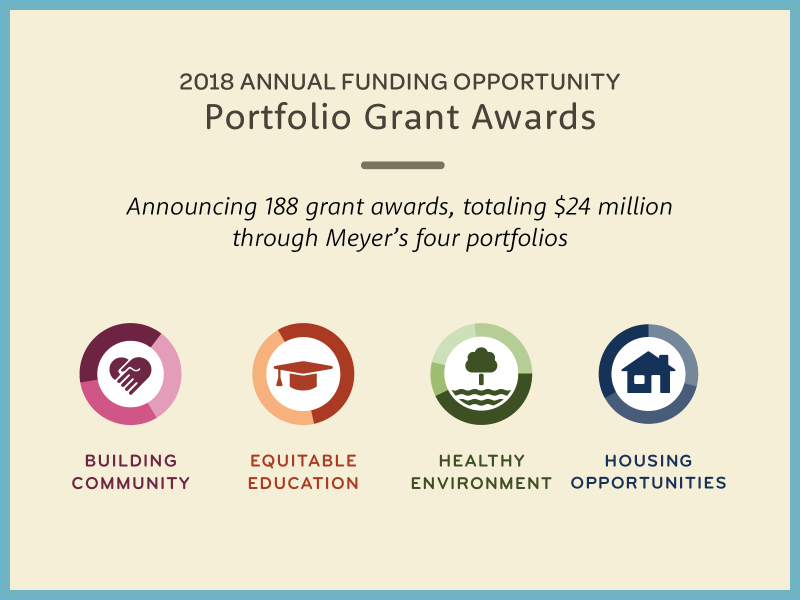
2018 PORTFOLIO GRANT AWARDS
Close card stack